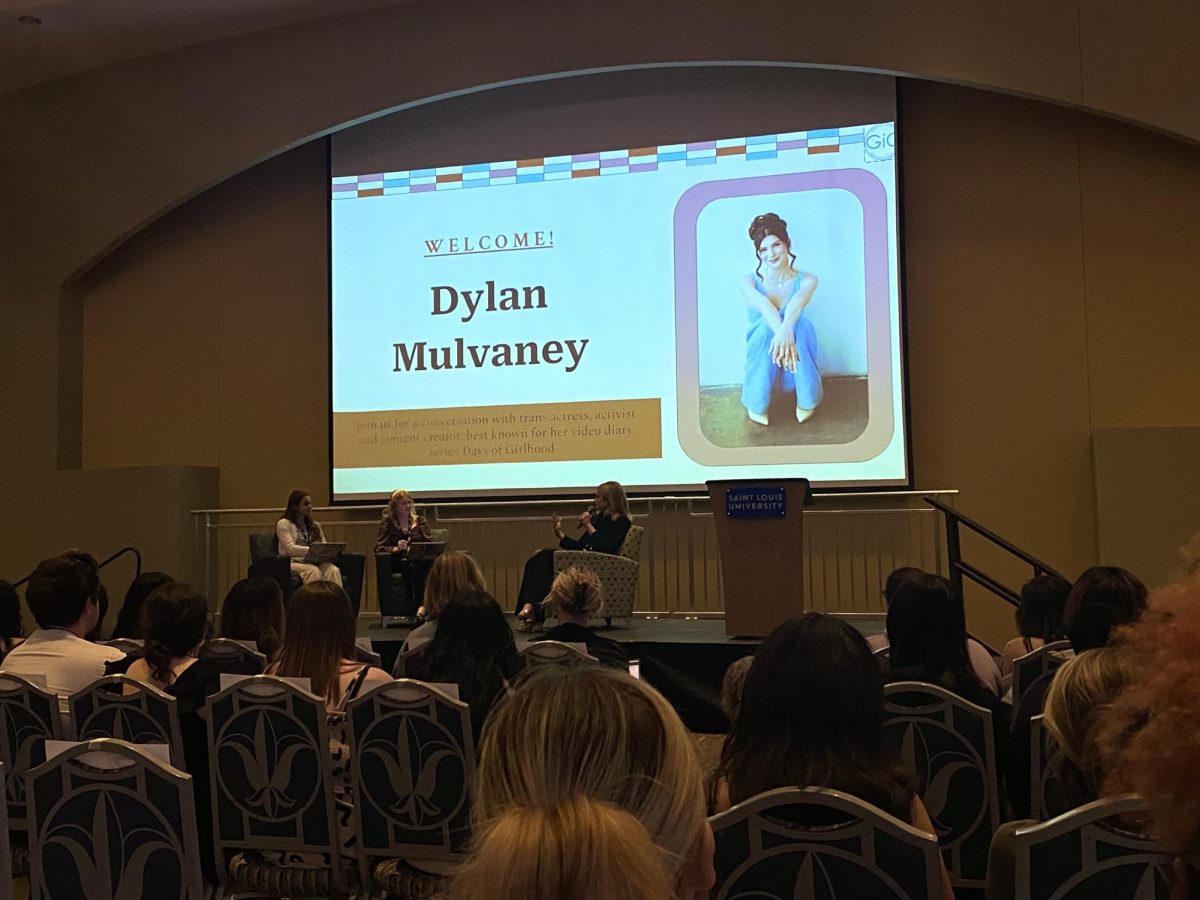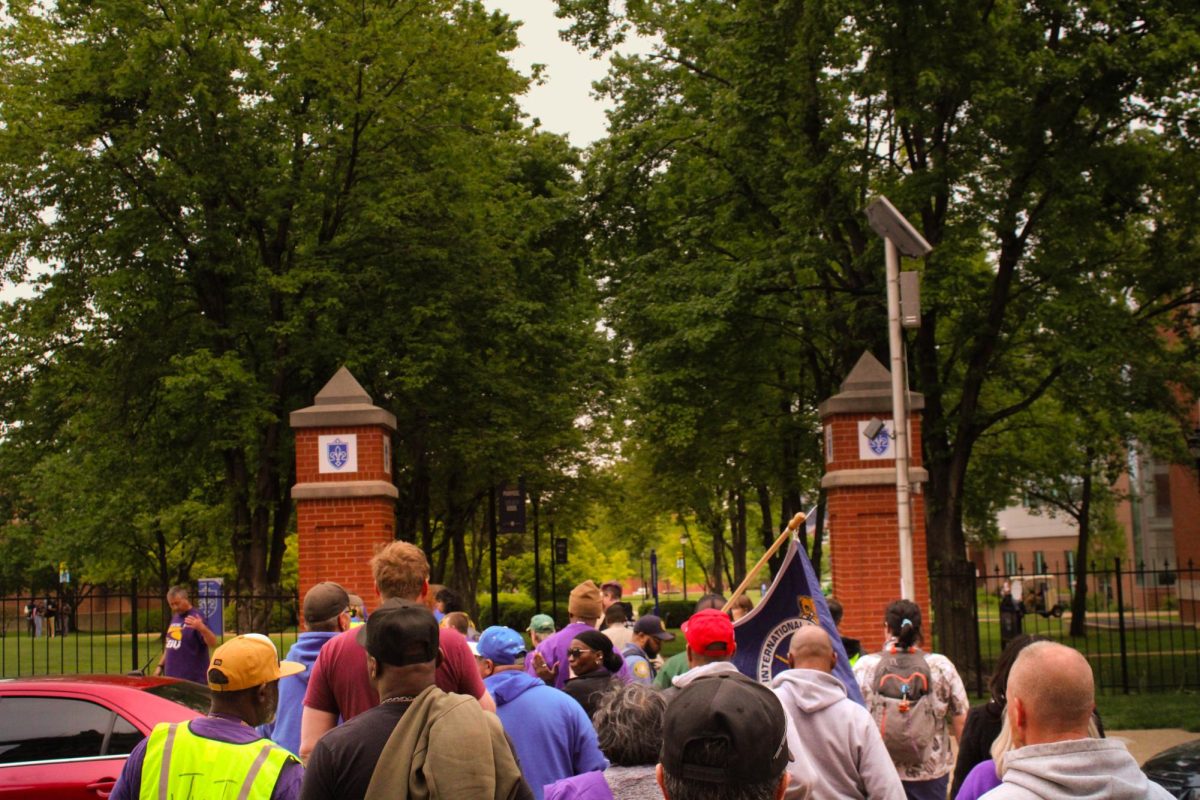On Monday night, the five candidates for the presidency of next
year’s Student Government Association debated formally for the
first time, as they answered questions from panelists, audience
members and each other for more than an hour.
The candidates addressed popular issues and problems at Saint
Louis University, like safety on campus, alleged misuse of the
Busch Student Center by the administration and student apathy, but
each also pointed out other problems he found with the school and
student government.
On a number of occasions, candidates criticized the way
University President Lawrence Biondi, S.J., deals with students
through the SGA–although there was some disagreement as to the
best way to restore the relationship.
“We only have problems at the highest level,” said Justin A.
Butler, of A Bird’s Eye View, who is the current financial vice
president, noting that Vice President of Student Development Kathy
Humphrey has been cooperative with the SGA.
“All we need to do is step up and say we have a problem; we need
to step up and say this is what we want.”
Adam Meister, of A Change of Course, asked the crowd to envision
the Quad filled with students protesting the administration and
said SGA should be backed by a student voice. He also called
Biondi’s recent mandate that certain campus groups hold events on
campus “absurd,” noting that, “When [student organizations] were
chartered, [they] were given that privilege (to choose where they
held events).”
“I don’t think shared governance is working this year, as
evidenced by [the BSC],” said Colin Tillman, of Ticket to Paradise.
“We need to get in the Quad and be heard.”
Jim Swift, of Students for Students, repeatedly took the most
direct stance against Biondi.
“The administration has gone too far. As shareholders of our
school, our voice is not being heard. The BSC should be for
students, not for Father Biondi,” Swift said, adding later, “I will
go to Father Biondi with what students want, not what they think
they need.”
He explained that he would leverage the president with the more
than $30,000 in tuition students give to the school each year.
Senior Paul Fitzgibbons, one of the evening’s four panelists,
called Swift’s attitude “coarse” and questioned whether the
approach would work with Biondi.
Swift replied that a strong stance needs to be taken in
addressing Biondi. Bryan J. Flanagan, of Gateway to Opportunity,
said he favored forming a more diplomatic relationship: “It’s not
about upsetting anyone. It’s not about making anyone angry, because
that doesn’t solve the problems.”
Almost as emphatic an issue as Biondi was student apathy and the
lack of school spirit at SLU, which candidates thought could be
solved through increased communication, integration of different
campus groups and involvement in athletics.
“We need to communicate in different ways with students,”
Tillman said. “It seems sad that we need to hold our students by
the hand in order to get them involved, but if that’s what it
takes, I’ll be in the Quad every day, handbilling.”
Butler said students need to know what their student government
is doing. “It’s about SGA getting out there, knowing our
constituency and just being more visible than we’ve been in the
past.”
Swift proposed creating a daily online message board for campus
dialogue and offering incoming freshmen discounted memberships in
Blue Crew.
Meister said his administration would use a polling system, open
presentations and executive board forums to give students more
access to SGA.
Flanagan said he would increase communication through the
Gateway system and informal meetings between SGA members and their
constituents. He also cautioned against Biondi misusing his
proposed on-campus arena in the same way, Flanagan said, that he
misuses the BSC.
Meister and Butler both stated in their closing statements that
the arena alone would not increase school spirit.
All of the candidates said they favored an increase in the
student activities fee, but they differed on the details.
Meister proposed a gradual increase over five years, whereas
Flanagan said he would increase the fee by $15 per student, per
semester.
Swift said he would put it to a student vote and urged more
scrutiny when it came to spending within chartered student
organizations, quipping, “Money should not go to a few, it should
go to you.” He emphasized the need for financial accountability
within CSOs.
Butler said he would reallocate funds to CSOs three times per
year, rather than once. He said the system would hold the sitting
executive board responsible for financial decisions it made.
Tillman also said he would lengthen the budgeting process,
rather than pack it into a short period of time.
Audience members also asked candidates what they thought about
the isolation of graduate students and the Allied Health campus
from undergraduate activities on the Frost campus.
Swift and Flanagan said the solution would be filling all the
senate seats, whereas Tillman suggested using social events.
Butler said the problem was one that needed to be fixed by CSOs,
not the SGA. Meister proposed taking the model of the co-sponsored
event, which his administration plans to implement among
undergraduate CSOs, and apply it to the divide between graduate and
undergraduate activities.
The issue of academic quality also arose. Meister said he would
work for class standardization, and Flanagan proposed a curriculum
review.
Swift said he would work to require professors to post their
syllabi online before courses began, adding, “I don’t care if you
have tenure … bad teachers need to go.”
During their opening remarks, candidates laid out their laundry
list of problems and their solutions for them, for the upcoming
school year.
Butler said he would create a police substation on campus, move
half of the Department of Public Safety’s daytime officers to the
night shifts, ensure that the administration release an annual
financial report and increase student comfort on campus by creating
a lounge in the BSC and introducing VIP dormitories.
Meister said that he would act as a voice for the Greek
community and that he planned to address safety problems.
Swift said he would work to change dining hours on campus to
better fit students’ schedules, persuade restaurants near campus to
accept SLU dining credits, put Chick-Fil-A and a 24-hour Starbucks
back in the student union, get DPS to work more diligently, disband
the Alcohol Task Force and improve parking options and safety.
Flanagan cited his experience with SGA in taking action against
the ATF and initiating a DPS escort van service. He said he would
place DPS officers on Grand Boulevard between Laclede Avenue and
Reinert Hall, work to improve Career Services and reallocate space
usage in the BSC to make offices more accessible. He also said he
would rectify the fact that tuition increases but scholarships do
not.
Tillman said he aims to make the school more “user-friendly” and
thinks organization is the key to fixing SLU’s problems. He said he
would work to streamline the budgeting process, hold DPS more
accountable and increase communication on campus.
Next Monday, all 24 executive board candidates will debate at 7
p.m. in BSC 170. On Tuesday, the candidates will be on hand to
socialize with their constituents at Wackadoo’s in the BSC at 7
p.m. for the annual Rock the Vote.






